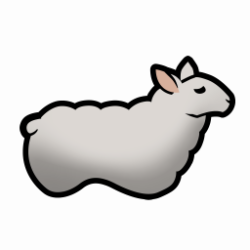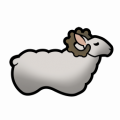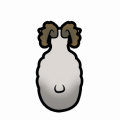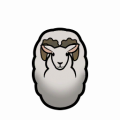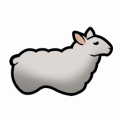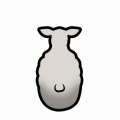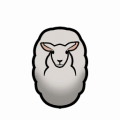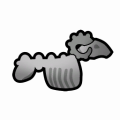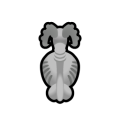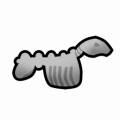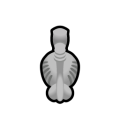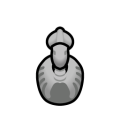Sheep
Sheep
Sheep husbandry is practised throughout the majority of the inhabited worlds, however only recently it has been introduced to the rimworlds. Domestic sheep are relatively small herbivores, usually with yellowish wool and medium sized horns.
Base Stats
- Type
- Animal
- Flammability
- 70%
Pawn Stats
- Combat Power
- 55
- Move Speed
- 4.8 c/s
- Health Scale
- 70% HP
- Body Size
- 0.75
- Mass - Baby
- 9 kg
- Mass - Juvenile
- 22.5 kg
- Mass - Adult
- 45 kg
- Carrying Capacity
- 56
- Filth Rate
- 8
- Hunger Rate
- 0.36 Nutrition/Day
- Diet
- herbivorous
- Life Expectancy
- 12 years
- Coastal Animal
- false
- Manhunter Chance
- 0%
- Manhunter Chance (Taming)
- 0%
- Trainable Intelligence
- None
- Wildness
- 0%
- Roam Interval
- 5 days
- Mate Interval
- 12 hours
- Maturity Age
- 0.333 years (20 days)
- Juvenile Age
- 0.25 years (15 days)
- Toxic Resistance
- 50%
- Toxic Environment Resistance
- 0%
- Comfortable Temp Range
- -20 °C – 45 °C (-4 °F – 113 °F)
Production
- Meat Yield
 105 sheep meat
105 sheep meat- Leather Yield
 33 plainleather
33 plainleather- Wool Amount
 45 sheep wool
45 sheep wool- Shearing Interval
- 10 days
- Gestation Period
- 5.661 days
- Offspring Per Birth
- 1-2 (1.318 avg)
Melee Combat
- Attack 1
- Head
14 dmg (Blunt)
21 % AP
2.9 second cooldown - Attack 2
- Front left leg
6 dmg (Blunt)
9 % AP
2 second cooldown - Attack 3
- Front left leg
6 dmg (Poke)
9 % AP
2 second cooldown - Attack 4
- Front right leg
6 dmg (Blunt)
9 % AP
2 second cooldown - Attack 5
- Front right leg
6 dmg (Poke)
9 % AP
2 second cooldown - Attack 6
- Teeth
8 dmg (Bite)
12 % AP
2 second cooldown
0.5 chance factor - Average DPS
- 2.8024
- tradeTags
- AnimalFarm, AnimalCommon
Sheep are easily tameable herbivores with a medium movement speed. Males of the species are referred to as Rams and can be distinguished by their rounded horns, while females are referred to as Ewes and lack horns. Babies of either gender appear identical to ewes and are referred to as Lambs. Despite the visual differences, adults of both genders have the same stats and attacks.
Acquisition[edit]
Sheep do not spawn as wild animals. Instead they must be purchased from a bulk goods traders or faction base, or join the colony in an Animals join events.
Summary[edit]
Sheep are pen animals. Once tamed, pen animals cannot and do not need to be trained any further. But if left outside of a pen or caravan hitching spot, pen animals will eventually roam outside your colony. Making a caravan is not required to tie animals to a caravan hitching spot.
Sheep can be sheared for ![]() 45 sheep wool (
45 sheep wool (![]() 121.5) every 10 days for 1,700 ticks (28.33 secs) of work. Note that yield and shearing time are modified by the shearer's Animal Gather Yield and Animal Gather Speed respectively.
121.5) every 10 days for 1,700 ticks (28.33 secs) of work. Note that yield and shearing time are modified by the shearer's Animal Gather Yield and Animal Gather Speed respectively.
Analysis[edit]
Wool[edit]
Sheep have the highest wool / nutrition ratio of all animals. Sheep produce as much wool as alpacas, but have a lower hunger rate.
An adult sheep eats 7.2 hay per day, which would require 5.2 tiles of haygrass to sustain. Sheep produce ![]() 4.5 wool per day. The same 5.2 tiles of cotton plant would produce
4.5 wool per day. The same 5.2 tiles of cotton plant would produce ![]() 3.54 units of cloth per day. Sheep wool is 80% more valuable per unit, making wool more profitable. This becomes further profitable if sheep are allowed to graze.
3.54 units of cloth per day. Sheep wool is 80% more valuable per unit, making wool more profitable. This becomes further profitable if sheep are allowed to graze.
However, textile supply usually isn't a problem. Cotton can be grown as long as its warm outside and there's soil around. Sheep are more efficient, but you'll have to buy (or otherwise get) sheep, which is an opportunity cost on its own. In the early game, cloth is usually "good enough" for all your textile needs. Sheep must also be sheared by an Animals handler, while cloth can be sown normally. If you don't have anyone good at Animals, sheep produce much less wool.
Nutrition[edit]
When slaughtered, a sheep yields 26 meat and 15 leather as a baby; 53 meat and 21 as a juvenile; or 105 meat and 33 leather as an adult. 1 meat is equal to 0.05 nutrition.
An adult sheep consumes 0.36 nutrition per day, and creates up to 0.23 offspring per day.
- When offspring are slaughtered as babies, a female sheep will produce 0.3 nutrition of meat per day, giving a nutrition efficiency of 84.1%.
- If the offspring are allowed to grow to adulthood, offspring will consume an additional 0.82 nutrition per day, but will instead yield 1.22 nutrition per day as they are slaughtered, resulting in a nutrition efficiency of 103.8%.
When considering a population of equal numbers of males and females, these nutrition efficiencies fall to 42% for baby slaughter and 79.5% for adult slaughter.
Training[edit]
This animal can be trained as follows:
| | |
| | |
| | |
| |
*As of version 1.1.2610, all animals can be tamed. The percentage of likelihood of success depends on factors such as the Animals Wildness Percentage, Pawn Handling Skill, and others. More information can be found on the animals page.
Health[edit]
The body part table is collapsed due to length. Expand to view.
| Part Name | Health | Quantity | Coverage[1] | Target Chance[2] | Subpart of | Internal | Capacity[3] | Effect if Destroyed/Removed |
|---|---|---|---|---|---|---|---|---|
| Body | 28 | 1 | 100% | 26% | N/A[4] | - | Death | |
| Spine | 17.5 | 1 | 3% | 3% | Body | Moving |
−100% Moving[5] | |
| Stomach | 14 | 1 | 3% | 3% | Body | Digestion |
−50% Digestion | |
| Heart | 10.5 | 1 | 3% | 3% | Body | Blood Pumping |
Death | |
| Lung | 10.5 | 2 | 3% | 3% | Body | Breathing |
−50% Breathing. Death if both lost. | |
| Kidney | 10.5 | 2 | 3% | 3% | Body | Blood Filtration | −50% Blood Filtration. Death if both lost. | |
| Liver | 14 | 1 | 3% | 3% | Body | Digestion |
Death | |
| Neck | 17.5 | 1 | 22% | 5.5% | Body | Eating Talking Breathing |
Death | |
| Head | 17.5 | 1 | 75% | 2.475% | Neck | - | Death | |
| Skull | 17.5 | 1 | 25% | 1.2375% | Head | - | Cannot be destroyed Increasing Pain based on damage. | |
| Brain | 7 | 1 | 70% | 2.8875% | Skull | Consciousness |
Death Damage always results in scarring. | |
| Eye | 7 | 2 | 12% | 1.98% | Head | Sight |
−25% Sight. −100% if both lost. Damage always results in scarring. 0% Hit Chance against Blunt damage. | |
| Ear | 8.4 | 2 | 8% | 1.32% | Head | Hearing |
−25% Hearing. −100% if both lost. | |
| Nose | 7 | 1 | 10% | 1.65% | Head | - | - | |
| AnimalJaw | 7 | 1 | 10% | 1.65% | Head | Manipulation |
−100% Manipulation. Can no longer use Bite attack. | |
| Front Leg | 21 | 2 | 7% | 5.95% | Body | Moving |
−25% Moving. −50% if both lost. Can no longer use Hoof attack.[6] | |
| Front Hoof | 7 | 2 | 15% | 1.05% | Front Leg | Moving |
−25% Moving. −50% if both lost. | |
| Rear Leg | 21 | 2 | 7% | 5.95% | Body | Moving |
−25% Moving. −50% if both lost. | |
| Rear Hoof | 7 | 2 | 15% | 1.05% | Rear Leg | Moving |
−25% Moving. −50% if both lost. |
- ↑ Coverage determines the chance to hit this body part. It refers to the percentage of the super-part that this part covers, before its own sub-parts claim their own percentage. For example, if the base coverage of the super-part is 100%, and the coverage of the part is 20%, 20% of hits would hit the part, and 80% the super-part. If the part had its own sub-part with 50% coverage, the chances would be 10% sub-part, 10% part, 80% super part.
- ↑ Target Chance is the actual chance for each part to be be selected as the target when each part's coverage has been taken into account(I.E. Neck covers 7.5% of Torso but Head covers 80% of Neck so it actually has only a 1.5% chance to be selected). This is not pure hit chance, as different damage types propagate damage in different ways. See that page for details.
- ↑ Note that capacities can affect other capacities in turn. Only the primary effect is listed. See specific pages for details.
- ↑ This is the part that everything else connects to to be considered 'connected'.
- ↑ If Moving drops below 16% a pawn cannot move.
- ↑ A Blunt/Poke attack with cooldown of 2s. The actual Hoof is unrelated
Attack table
| Attack (Damage type) |
DPS[1] (Post Hit Chance)[2] |
Dam. | Cool. | AP | Selection chance[3] | |
|---|---|---|---|---|---|---|
| Average | 4.52 (2.8) |
- | - | 18.15% | - | |
| Head (Blunt) |
4.83 (2.99) |
14 | 2.9s | 21% | 75% | |
| Front left leg (Blunt) |
3 (1.86) |
6 | 2s | 9% | 5% | |
| Front left leg (Poke) |
3 (1.86) |
6 | 2s | 9% | 5% | |
| Front right leg (Blunt) |
3 (1.86) |
6 | 2s | 9% | 5% | |
| Front right leg (Poke) |
3 (1.86) |
6 | 2s | 9% | 5% | |
| Teeth (Bite) |
4 (2.48) |
8 | 2s | 12% | 5% | |
- ↑ Note: This is the actual base average derived from the melee verb system updated in 1.1.2610, it may sometimes disagree with the listed value in the in-game infobox.
It may also change depending on the stats and the melee verbs available to the pawn. - ↑ Assuming a melee hit chance of 62%
- ↑ Chance for attack to be selected. It may change depending on the melee verbs available to the pawn.
Gallery[edit]
Version history[edit]
- 1.1.0 - Added as part of the integration of the Vanilla Animals Expanded - Livestock mod into the basegame.
